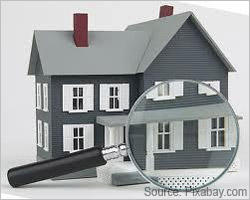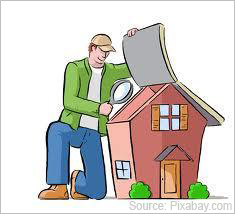
It's common knowledge that before you commit to buying a new home and before you begin the process of actually moving into a new home, you should have that home inspected by a reliable and trustworthy home inspector to make sure that it's completely up to code. You want the home inspector to give an objective and honest evaluation of the most important areas of the home, so you know what you're getting into before you move. That means making sure that all of the construction is up to code and that aren't any major problems or flaws in the structure.
Your home inspector will typically know the most important areas of the home to inspect, but it's also helpful for you to have a list of the main areas of inspection so you can make sure the inspector gets to everything that needs to be assessed and let him know if there are any problem areas that he missed. This guide will discuss the main parts of the house that should be evaluated during your routine home inspection and what you need to check for to make sure that your house is up to code.
Exterior and Common Areas
The exterior and common areas of your home include everything on the outside of the house, as well as a few areas inside your home and are some of the most important parts of your house, as far as the structural integrity of the house goes. When checking to make sure that your house is up to code, these areas are considered to be the most commonly affected areas of the house and the ones that you should check the most thoroughly to ensure that your house is safe and that all areas are functioning properly.
Foundation/Exterior
Perhaps the most important part of the home inspection, the foundation is what keeps the house standing. Without a solid foundation, the home can be subjected to structural damage and many other problems further down the line. The inspector should check for any cracks in the foundation or any other flaws.
The roof is another highly important area to have evaluated. The inspector should check for any cracks are weak spots that may become vulnerable in high winds or subject to leaking during heavy rain or snow.
Here are some of the other things that should be checked:
- Does the roof have any leaks?
- Are there are any noticeable cracks, holes, or loose parts of the foundation or exterior walls?
- Are there any porches on the outside of the house? If so, are all porches secure and stable and are they safe?
- Are all hand railings on the outside of the house secure and functioning properly? Not that all stairs with three or more steps are required to have hand rails.
- Is there any standing water outside your house or close to the foundation of the house that can potentially cause any leaks?
Walls/Floors/Ceiling

The walls, floors and ceiling in the interior of your house is an area that is a lot more visible to the naked eye than some of the others on this list, so that makes it a little easier to notice any obvious flaws or damage. However, that doesn't make it any less important. Be on the lookout for any cracks, dents, uneven floors, or spots of water damage.
Also, the common areas of your home like hallways and stairways have their own codes that must be checked. Stairways are especially important, as uneven or unsafe staircases can be dangerous and can lead to your house not being up to code and failing inspection.
Also make sure to check:
- Are all of your hallways and stairways properly lit by either natural or electric light?
- Are all stairways equipped with hand rails that have been secured to the wall properly and are stable?
- Are there any cracks or water damage in the ceiling, wall, or floors of any common area of the home?
Windows and Doors
All of the doors and windows in the home should also be thoroughly examined for any damage and to make sure that they all open and close properly. Aside from the exterior of the house and the foundation and roofing, your windows and doors are the most structurally significant portions of your home that are essential in keeping your house secure. Properly functioning doors and windows are often overlooked in their importance, but in order to keep your house up to code, you should regularly check your windows and doors to make sure that they are being properly maintained.
In addition, here's what else you need to look for when inspecting the windows and doors of your house:
- Do all locks on your doors and windows work properly and are all entryways secure?
- Are there more than two safe ways to exit your house in the event of an emergency?
- Are your windows and doors properly sealed so as to not allow any rain or water into your house?
- Are any of your windows or doors broken or damaged in any way that could prevent them from functioning properly or being properly secured?
- Are there screens on all windows?
- Does each room in your house have a window that is able to be opened providing proper ventilation if needed?
Electric and Water
Plumbing
The inspector should check the home's plumbing to make sure that everything works smoothly, including all of the faucets and shower installments and should check for any leaks. Also, make sure that the water pressure is at the correct level and the water heater is fully functional.
Also:
- Do any of your pipes have a leak?
- Are all pipes in fully functioning condition without signs of damage or weakness?
- Is the gas burning hot water heater venting to the outside of your house? Make sure that it is not venting to any interior rooms in your house like the bathroom or bedrooms.
- Is your water pressure at the correct level?
- Are your faucets functioning correctly?
Electrical System
There is nothing worse than moving into your new home and finding out that the lights and power don't work the way they should. This can interrupt a lot of your daily routines and affects every part of your life, from cooking and cleaning, to watching TV and working. The inspector should check all of the wiring and circuit breakers.
Make sure to also check the following:
- Are there any electrical outlets in the house that are not functioning properly or could be in danger of shorting out or causing a fire?
- Are all light switches and other fixtures also functioning properly?
- Is your electrical box up-to-date and situated in a safe location?
Of course, these are not the only parts of the home that will be inspected, as your home should undergo and full and thorough inspection process that evaluates every aspect, however they are the most important, so make sure that all of these areas are double- and triple-checked during the inspection.